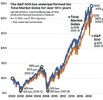- Joined
- 29 June 2021
- Posts
- 11
- Reactions
- 14
As a relative newcomer to the markets, I was initially very cautious investing even a small amount into shares but now after six months watching it climb I'm kicking myself for not placing more in. I'm just investing in safe ETF's for the time being and have good cash sitting in a mortgage offset only making 2%. For the more experienced investors, do you feel safe putting all your money into stocks? Should I be doing this with the ETF's?

